Monday, November 16th, 2020 by Julian Karsunky
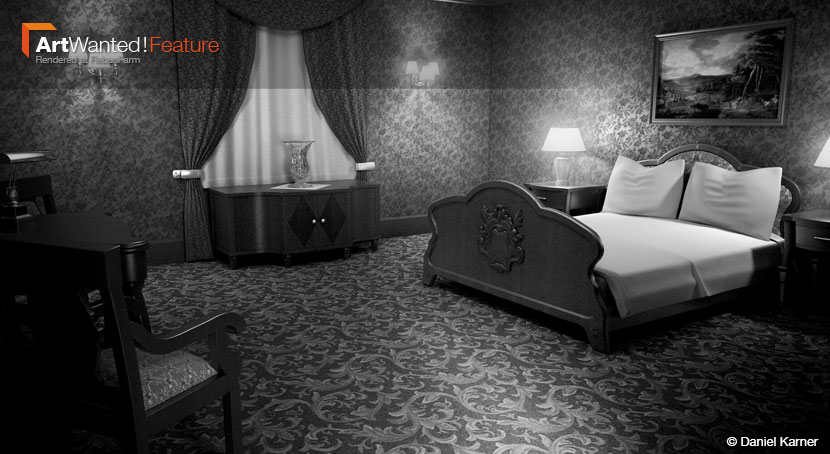
While Halloween is behind us, the spookiness continues with our November 2020 ArtWanted! feature. Our friend Daniel Karner has been busy working on ‘The House’, a passion project in the truest sense of the word: combining his lifelong love for 3D, gaming and classic horror, Daniel is putting in the extra hours in the evenings and on the weekends to create his own game. Following the story of a realtor tasked with selling an old boarding house, ‘The House’ is shaping up to recapture the wonderfully eerie feelings of a scary movie night.
In our interview, Daniel recalls early inspirations, the terror of the unseen and reflects on the joys and woes of game development.
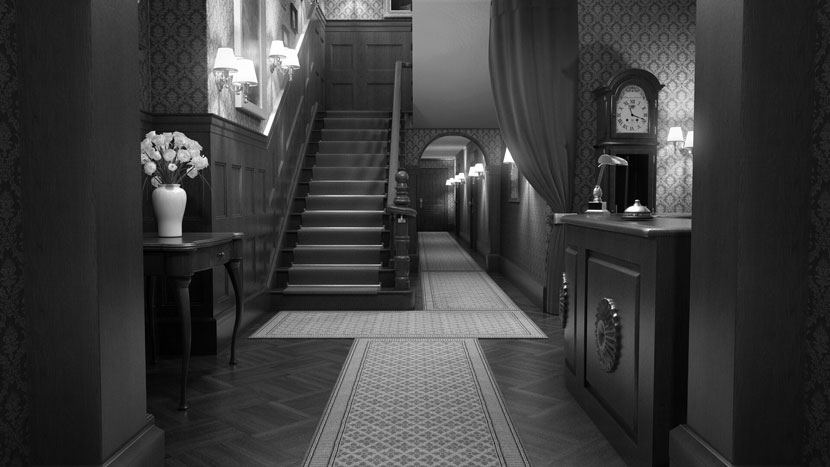 The entrance area of Daniel Karner’s game ‘The House’, an eerie first-person experience in the vein of classic horror movies.
The entrance area of Daniel Karner’s game ‘The House’, an eerie first-person experience in the vein of classic horror movies.
Hi Daniel, we’re glad to have you back, it’s been quite a while. To start things off, please introduce yourself to our readers!
Hi everybody, my name is Daniel Karner, I'm a 39-years-old 3D artist living in Southern Germany in a small town near Stuttgart.
Do you recall when and how you first consciously encountered CGI?
From a young age, I have always been fascinated by visuals effects. As a kid, I used my dad’s Super8 camera to create my own stop motion films, simple short clips with toy cars and Lego figures. Then in 1993, I was completely blown away when I first saw Spielberg’s 'Jurassic Park' in the movie theater. While I knew the dinosaurs on the screen were somehow computer-generated, I had no clue how it was done, I was completely enthralled.
Of course, twenty-five years ago, visual effects was not yet a viable career choice or study option, so I became an electrical engineer instead.
When and why did you decide to pursuit a professional career as a 3D artist?
In 2001, upon seeing 'Shrek' at the movie theater, that feeling hit me again. I immediately fell in love with that movie and it triggered my desire to do computer graphics myself. I made my first steps with a demo version of 3D Studio Max R2.
What training or education do you have?
As a 3D artist, I'm completely self-taught. Back then, there were no online learning resources readily available, so it was a tough and tedious process. Eventually, I applied for an internship at Unexpected, a 3D/VFX company in Stuttgart, Germany. They liked my work and I continued to work for them after my internship ended, first as a freelancer, later as a regular employee.
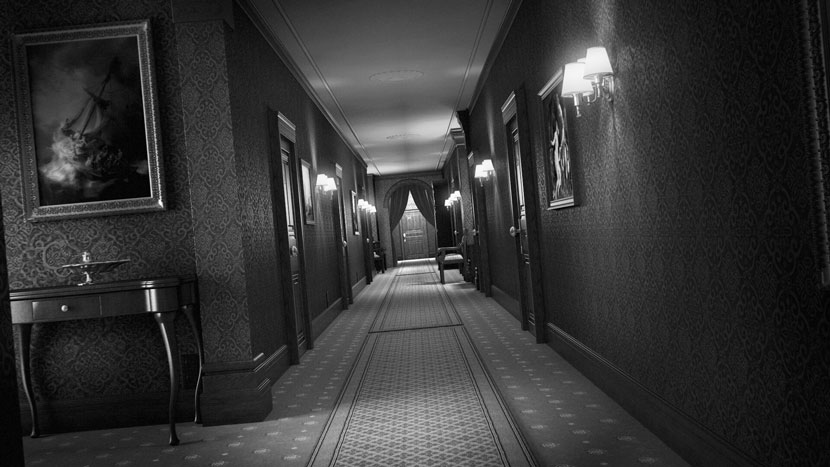 Tingling your imagination ever so slightly without revealing much, this twisted hallway fills you with a delightful sort of dread.
Tingling your imagination ever so slightly without revealing much, this twisted hallway fills you with a delightful sort of dread.
Are you currently still with Chasing Carrots? Please tell us more about the company, its history, its field of work and general philosophy!
Yes, I'm still with Chasing Carrots and thankful for it, I like working here a lot!
Chasing Carrots started back in 2011 as small indie game studio with four people. So far, we've released four games, available on most major platforms: 'Pressure' and 'Pressure Overdrive' are both lighthearted steampunk bullet-hell shoot-em-ups. 'Cosmonautica' was our first management-sim game, and our latest game 'Good Company' a tycoon management game with a very unique look, is currently in early access.
What are your main responsibilities and daily tasks?
I'm doing most of the 3D work like creating models, textures and animations, all in collaboration with our concept artist Johanna. I'm also responsible for the more technical stuff like shader writing and performance optimization. It's a great and versatile mix between art and technology.
How are you holding up in these trying times? Has the current crisis impeded your work?
In the first weeks, at the beginning of the crisis, we had some minor starting difficulties with our workflow but we have been doing pretty well since ironing these out. Of course, we would all prefer to work in our office because we're missing the social interactions, like having lunch together and it's much easier to tackle problems via face-to-face discussions.
As evident by your work ‘Back in 1991’, you clearly have a long history with gaming. Was it always your goal to one day work in the industry?
I was a passionate gamer, true, but I never even thought of working in the games industry. Even when I set my eyes on a career as a 3D artist, I was primarily interested in high-end CG and back then, 3D graphics in games were pretty low poly, with small and blurry textures. About ten years later, when I was presented the opportunity to work for Chasing Carrots, graphics in games had improved dramatically. Still, I had no clue about creating real-time CG, but I was equally curious and interested, so I said “yes”!
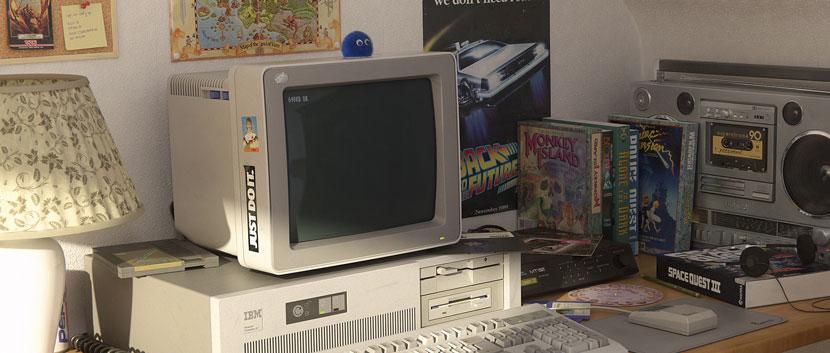 ‘Back in 1991’, Daniel’s love letter to the golden age of computer gaming, earned him the title of RebusFarm 3D Artist of the Month in April 2017.
‘Back in 1991’, Daniel’s love letter to the golden age of computer gaming, earned him the title of RebusFarm 3D Artist of the Month in April 2017.
Having turned your passion into a career, has working on games changed your perspective as a gamer?
Yes, absolutely! Game development is such a complex and demanding work. Now I completely understand why games have bugs or release dates are frequently postponed.
Considering the technological advancements as well as the increase in popularity from the days of DOS based text adventures, what is your take on the state of the art and industry?
It's much easier to develop games today than it was 20 years ago. Back then, there were no game-engines like Unity or Unreal Engine, you had to write your own engine and tools. There also were no schools or learning resources. Nowadays, you can just download the tools of your choice and you're ready to go.
This has not only led to a much greater variety in terms of gameplay and look, it also has never been easier to start a career in the game industry.
What aspects of gaming do you personally enjoy the most?
Good question! I think I really enjoy the immersive experience regardless of whether it's an old text adventure, a multiplayer shooter or a modern action game.
Is there a specific design philosophy or school of thought you adhere to? What inspires you as a 3D artist?
I don't really have a specific design philosophy, but at the start of every new project, especially 3D-stills, I always ask myself: what emotions do I want to evoke in the viewer? My biggest inspirations are movies and games, of course, but I also draw inspiration from books and photos.
Let’s talk about your work in more detail, namely your submission to our campaign, a cinematic trailer for your own game, ‘The House’. Before we dive deeper into the trailer, please tell us all about the game itself!
Can you first describe the basic concept behind your game in more detail? How did you come up with the original idea?
Well, those old black and white horror/thriller movies from the 1950s and 1960s have always held a special place in my heart. Most of these movies didn't have a big budget, which is why the filmmakers had to be creative and improvise with lighting, composition and editing, all so that your imagination will come up with something more horrifying than what is actually shown on the screen. I want to recreate that feeling in an immersive, first-person game, wrapped in a captivating story.
What type of gameplay can we expect from ‘The House’?
It's an eerie, story-driven first-person game with a slight touch of survival horror, but there will be no graphical violence at all. There will be a unique feature on top of that, but I don't want to spoil too much at this point.
Another big motivation is the very positive feedback and encouragement I have received from all kinds of people!
What is your main motivation for this ambitious project?
Besides my love for horror games and movies, I really enjoy learning new things in coding or audio design. It's just so satisfying to successfully implement a feature, like a working player inventory after two weeks of coding.
A working player inventory is a thing of beauty for every game dev!
When we spoke last in April 2017, you already mentioned working on a game prototype. How long has ‘The House’ been in development?
It's been exactly 4 years ago since I started by sketching out a first draft on paper. It seems like a long time, but ‘The House’ is still a personal side project next to my regular work at Chasing Carrots. I really only have time to work on it in the evenings and occasionally on the weekend.
What is the current state of the game? Do you have a rough release date in mind?
The basic game features are implemented, so the player can interact with objects, pickup, use and combine items. Of course, a lot of graphical assets are still missing, but the overall art direction is done and you can already fully roam some areas. It’s way too early for a release date, it's even too early for a prototype release date. However, I'm currently trying to acquire funding for the game, which could potentially speed up the process significantly!
Tell us more about the development process itself! Are you working on ‘The House’ all by yourself?
At the moment I'm working on the game all by myself, but should I receive funding, I will engage a writer, who's already very interested in the project, to support me with the overall story design.
What engine and software are you working with? What platform(s) are you planning to release on?
I use Unreal Engine 4 for the game itself. The 3D-assets are modeled and textured in 3ds Max and I use Substance Painter for some texture work.
It's too early to think about releasing platforms but I already have implemented keyboard/mouse and controller support.
Working in the industry as part of a team, you obviously have a firm grasp on game development as a whole. Still, there is a big difference between working on assets and models and handling an entire production by yourself!
Do you have previous experiences in other areas such as game design and programming?
As an electrical engineer, I learned to program assembler for different kinds of micro-controllers, so I have a good understanding of programming. However, object-oriented programming languages like C# or even C++ are quite challenging and I ended up using the Blueprints Visual Scripting system in Unreal Engine.
Thanks to my job at Chasing Carrots, I also have experiences in game design. We’re a small indie studio, so all of us are constantly having discussions about improving our games, and everybody has designed or balanced parts of our games.
How challenging, but maybe also creatively liberating is working on ‘The House’?
Sometimes it's very challenging. For example, there is rippled glass in some outdoor windows the player can look through and see the dim lit interior. I tried to build some small simple scenes and place them behind the windows, but the overall look didn't meet my expectations and it took too long to setup. It gave me headaches for a quite a while. Ultimately, I ended up creating a prerendered spherical environment map and a clever interior cubemap shader that could be easily tweaked, and the result was extremely good and satisfying.
Let’s finally take a closer look at the trailer you released! How long did it take you to complete this teaser?
Fortunately, I could reuse a lot of assets I had already made for other projects, so the teaser took me between three and four months of free-time to create.
What were some of the challenges you had to overcome? What parts of the trailer were especially important to you?
The overall look and feel were very important to me, so I didn't care too much about the story and logic. It's just an animated concept art, so to speak. The biggest challenges in creating the trailer was the lighting. The interior environments had to be well lit but also appear eerie at the same time.
How satisfied are you with the results? What has the feedback been like?
I'm very satisfied with the look and feel and the overall feedback was very positive.
Considering one of your early works pays homage to ‘The Shining’, it probably is no coincidence that the long hallways of ‘The House’ evoke similar feelings to Stanley Kubrick’s iconic movie, whereas the font is more reminiscent of old b-movie type horror flicks.
Can you tell us a bit more about your artistic choices and the overall aesthetic you’re going for?
There are a lot of different movies that influenced the art direction of ‘The House’. I think it's a mixture between old B-Movies like William Castle’s 'House on Haunted Hill', and more modern horror films like James Wan’s 'The Conjuring'. 'The Shining' had a huge impact on the abandoned feel of 'The House', of course, although they serve a very different purpose in their respective stories.
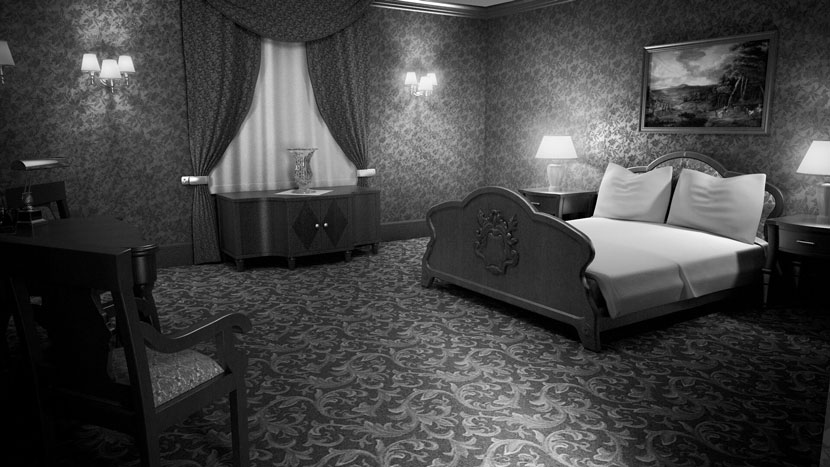 What mysteries lie hidden in the rooms of ‘The House’? Although it is still too early for a release dates, the answers will be revealed eventually!
What mysteries lie hidden in the rooms of ‘The House’? Although it is still too early for a release dates, the answers will be revealed eventually!
What is something you have learned while working on ‘The House’ that you can share with us?
In the beginning, I had so many doubts regarding the project and I had to overcome so many technical obstacles, but in the end, everything always works out. I know it sounds a little bit cliché, but: believe in yourself, you can do it!
What software did you use to create the trailer? Any plug-ins you found particularly helpful?
Modeling and rendering was done with 3ds Max and V-Ray. Compositing was done with the open-source compositing software Natron which has a very handy shadertoy plugin. I created a 2D-wobble distortion shader with shadertoy and used it to achieve the wobble of the title.
Please tell us more about your previous experience with RebusFarm. Is there anything you especially like about our service?
First and foremost, the simplicity and the speed of using RebusFarm! It only takes a few clicks, and the whole scene is uploaded and ready to render.
In closing, is there anything else you want to say? Any shoutouts, plugs or present or upcoming projects you’d like to mention?
A big thank You to Agon Ushaku from Unexpected who gave me the opportunity to start as a 3D artist!
If you are interested in our new game 'Good Company', you can find it on STEAM or on GOG!
Daniel, thank you so much for taking the time and all the best in the future!
Keep up with Daniel Karner and his work here:
How to join ArtWanted!
You want to get featured in our ArtWanted! campaign and win 250 RenderPoints on top? Submit your work, rendered at RebusFarm, to 이 이메일 주소가 스팸봇으로부터 보호됩니다. 확인하려면 자바스크립트 활성화가 필요합니다.! Visit our Art Wanted! page for more information.
>> Read more articles on our blog
